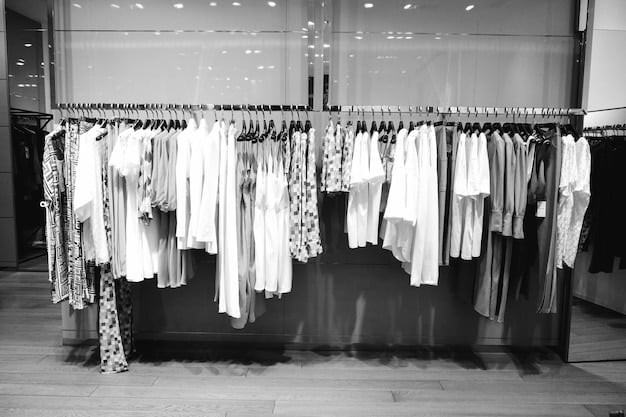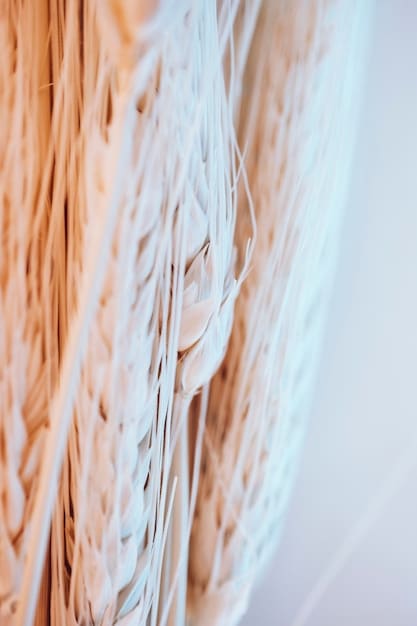Sustainable Style: 3 Eco-Friendly Women’s Fashion Brands in 2025

Anúncios
Sustainable style in 2025 highlights eco-friendly women’s fashion brands like Stella McCartney, Reformation, and Eileen Fisher, all committed to eco-friendly practices that reduce waste and help create more ethically made and durable pieces.
Anúncios
Discover the impact of sustainable style with these pioneering women’s fashion brands making a huge difference in 2025. They are committed to eco-friendly practices to reduce waste providing consumers with a more ethically made product.
What is Sustainable Fashion?
Sustainable fashion is an approach to designing, manufacturing, and using clothing and accessories in an environmentally and socio-economically responsible manner. It seeks to minimize the negative impacts of the fashion industry on the planet and its people.
Anúncios
This includes reducing carbon emissions, conserving water, using eco-friendly materials, and treating workers ethically—basically, a holistic approach. Beyond environmental concerns, sustainable fashion also takes ethical labor into consideration, ensuring fair wages and safe working conditions for garment workers.
Key Principles of Sustainable Fashion
Sustainable fashion has a core set of principles that guide companies in making responsible choices. Here are some of the most important practices:
- Eco-Friendly Materials: Using organic cotton, recycled fibers, and innovative materials like Piñatex (pineapple leaf fiber).
- Ethical Production: Ensuring fair wages, safe working conditions, and no child labor in production facilities.
- Waste Reduction: Employing zero-waste design techniques, minimizing textile waste, and promoting recycling and upcycling programs.
- Durability and Longevity: Creating high-quality, timeless pieces that last longer and reduce the need for frequent replacements.
Ultimately, sustainable fashion is about creating a system that supports both environmental health and social justice. It encourages a shift in mindset, urging consumers to buy less, choose well, and make it last.
Top 3 Eco-Friendly Women’s Fashion Brands
As consumers become more conscious of their environmental footprint, more companies are stepping up to offer choices for consumers who want ethically made or sustainable products. Here are three eco-friendly women’s fashion brands that are leading the way towards a more sustainable future:
These brands are not only committed to sustainability but also stand out for their unique designs, quality, and impact within the fashion industry.

Stella McCartney
Stella McCartney is renowned for her unwavering commitment to ethical and sustainable practices since launching her brand in 2001. A lifelong vegetarian, McCartney has never used leather, fur, or skins in her designs, setting a new standard for luxury fashion.
Her brand incorporates a variety of eco-friendly materials and innovative technologies. This results in collections that are both high-fashion and environmentally conscientious.
- Eco-Innovations: Uses recycled polyester, organic cotton, and regenerated cashmere, reducing reliance on virgin materials.
- Sustainable Practices: Implements water-saving technologies and partners with organizations to protect forests and biodiversity.
- Ethical Labor: Ensures fair wages and safe working conditions throughout her supply chain.
Stella McCartney’s dedication to sustainability has made her a pioneer in the industry. This has influenced other brands to adopt more responsible practices.
Reformation
Reformation has quickly become a favorite among eco-conscious consumers. Founded in 2009, the brand focuses on creating stylish, sustainable clothing using eco-friendly materials and responsible manufacturing processes.
Reformation is committed to transparency, providing detailed information about the environmental impact of their products. They are open about the impact their products have along with possible solutions.
Sustainable Initiatives by Reformation
Reformation employs several strategies to reduce its environmental footprint:
- Sustainable Materials: Utilizes recycled and repurposed fabrics, as well as sustainably sourced materials like Tencel and organic cotton.
- Water Conservation: Implements water-efficient dyeing and manufacturing processes to minimize water usage.
- Carbon Offset: Invests in projects to offset its carbon emissions, aiming to become climate positive.
Their commitment to transparency, combined with a focus on stylish and flattering designs, has solidified Reformation’s position as a leader in sustainable fashion.
Eileen Fisher
Eileen Fisher has been a pioneer in sustainable fashion since the 1980s. The brand is known for its timeless, minimalist designs and commitment to environmental and social responsibility.
Eileen Fisher focuses on creating high-quality, durable pieces that can be worn for years. They promote taking care of the pieces to make them last longer.

Key Sustainable Practices of Eileen Fisher
Eileen Fisher’s sustainability efforts encompass various aspects of their business:
- Renewable Fibers: Uses organic cotton, linen, and other renewable fibers, reducing reliance on synthetic materials.
- Recycling Program: Offers a take-back program where customers can return used Eileen Fisher clothing for resale or repurposing.
- Ethical Production: Partners with factories that prioritize fair wages, safe working conditions, and worker empowerment.
Eileen Fisher’s commitment to circularity and ethical production has made it a respected and influential brand in the sustainable fashion space.
How These Brands Are Making a Difference
Stella McCartney, Reformation, and Eileen Fisher are making a difference in the fashion industry through sustainable and ethical practices. They each address environmental and social issues in unique ways.
These brands tackle the challenge of fast fashion. This encourages consumers to buy less and only what they love or need.
Environmental Impact Reduction
Fashion production contributes to pollution and resource depletion. These brands focus on minimizing their environmental impact:
- Reduced Water Usage: Implementing water-saving technologies and using less water-intensive materials.
- Waste Reduction: Employing zero-waste design techniques and recycling programs to minimize textile waste.
- Carbon Footprint Reduction: Investing in carbon offset projects and using renewable energy sources.
These efforts help reduce the environmental harm caused by fashion, setting an example for other brands to follow.
Ethical Labor Practices
Ethical labor is a very important aspect of sustainability, and these brands prioritize the well-being of workers throughout their supply chains.
Workers are people who often face exploitation, unsafe working conditions, and unfair wages.
Prioritizing Fair Treatment
Some of the things these brands do to empower garment workers:
- Fair Wages: Ensuring workers are paid fair wages that meet their basic needs.
- Safe Working Conditions: Providing safe and healthy working environments, free from hazards and discrimination.
- Worker Empowerment: Supporting worker empowerment programs, such as training and education initiatives.
By prioritizing ethical labor practices, these brands contribute to the well-being and dignity of garment workers worldwide.
The Future of Sustainable Women’s Fashion
The future of sustainable women’s fashion looks promising, with increasing consumer awareness and interest in eco-friendly and ethical brands. Innovation is driving the industry. More brands are stepping up to meet the growing demand.
As technology advances and consumers demand more sustainable options, the fashion industry is likely to see even more innovative and responsible practices in the years to come.
Trends Shaping the Industry
There are several emerging trends that are set to shape the future of sustainable women’s fashion:
- Circular Fashion: Designing clothing for durability, recyclability, and reuse, promoting a closed-loop system.
- Transparency and Traceability: Providing consumers with detailed information about the origins, materials, and production processes of their clothing.
- Technological Innovation: Using advanced technologies like 3D printing, AI, and blockchain to optimize production processes and reduce waste.
These trends promise to drive the sustainable style market forward, creating a more responsible and resilient fashion industry.
| Key Point | Brief Description |
|---|---|
| 🌱 Eco-Friendly Materials | Using organic, recycled, and innovative materials. |
| 🤝 Ethical Production | Ensuring fair wages and safe working conditions. |
| ♻️ Waste Reduction | Minimizing textile waste and promoting recycling. |
| ⏳ Durability | Creating long-lasting, high-quality pieces. |
FAQ
▼
Sustainable fashion is designing, making, and wearing clothes in a way that protects the environment and treats workers fairly. It’s about reducing waste and making clothes that last longer.
▼
Sustainable fashion helps reduce the environmental impact of the clothing industry. It promotes fair labor practices and reduces pollution. It also encourages consumers to make more responsible choices.
▼
Look for brands that use eco-friendly materials like organic cotton and recycled fibers. Check if they have certifications for ethical production and transparency. Sustainable fashion brands often share detailed information about their products.
▼
Materials like organic cotton, recycled polyester, hemp, and Tencel are considered sustainable. These materials have a lower environmental impact than traditional options. The do that by using less water and reducing pollution.
▼
Fast fashion means cheap clothing that is made so that it’s current with today’s trends. The clothing has a large impact on the earth because they are typically not made of eco-friendly materials and they will end up in landfills when the style fades.
Conclusion
In 2025, sustainable style is more than just a trend; it’s a movement with brands like Stella McCartney, Reformation, and Eileen Fisher leading the way. By prioritizing eco-friendly materials, ethical production, and innovative practices, these brands show that fashion can be both stylish and sustainable. As consumers become more conscious, choosing to support these brands can make a difference.






